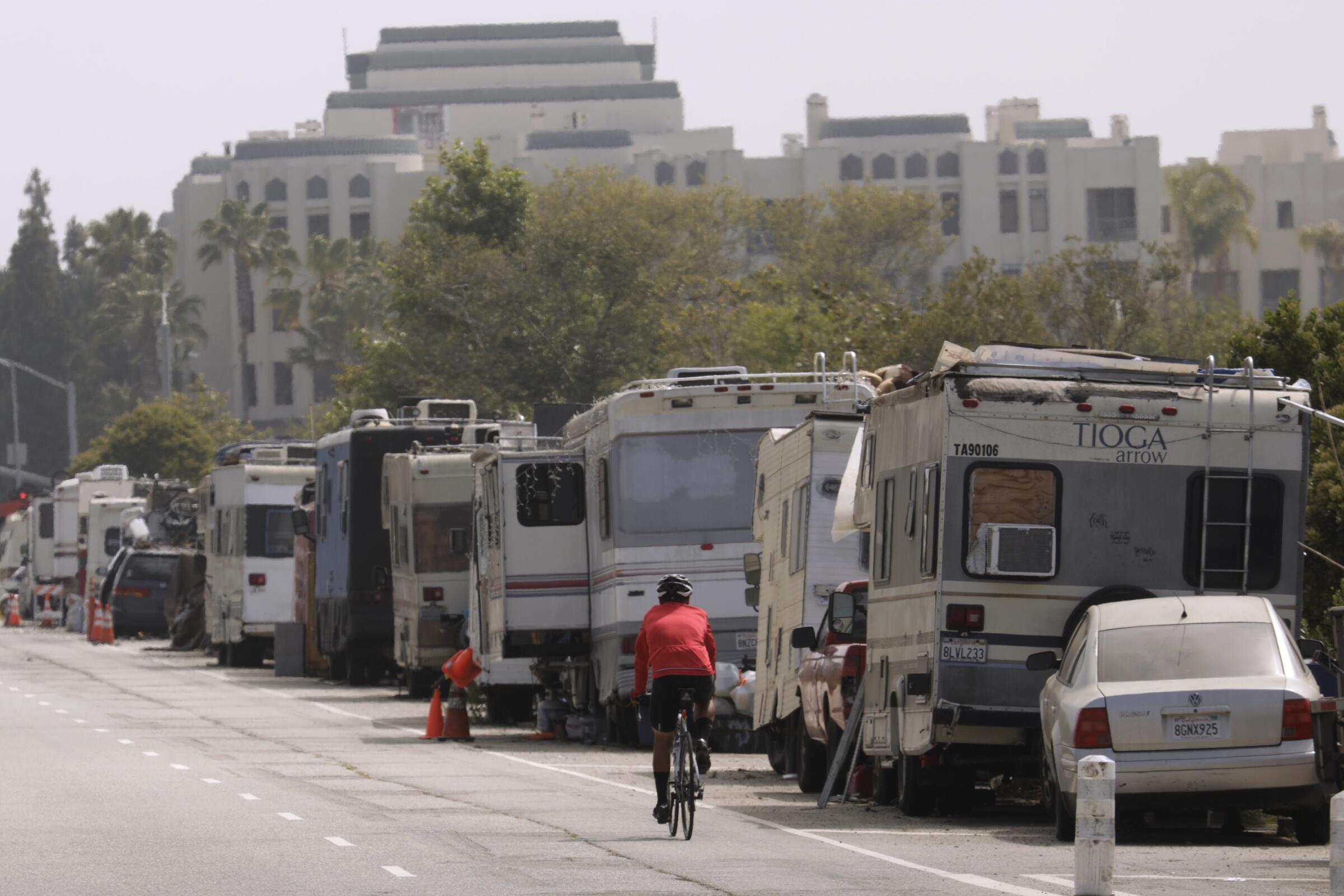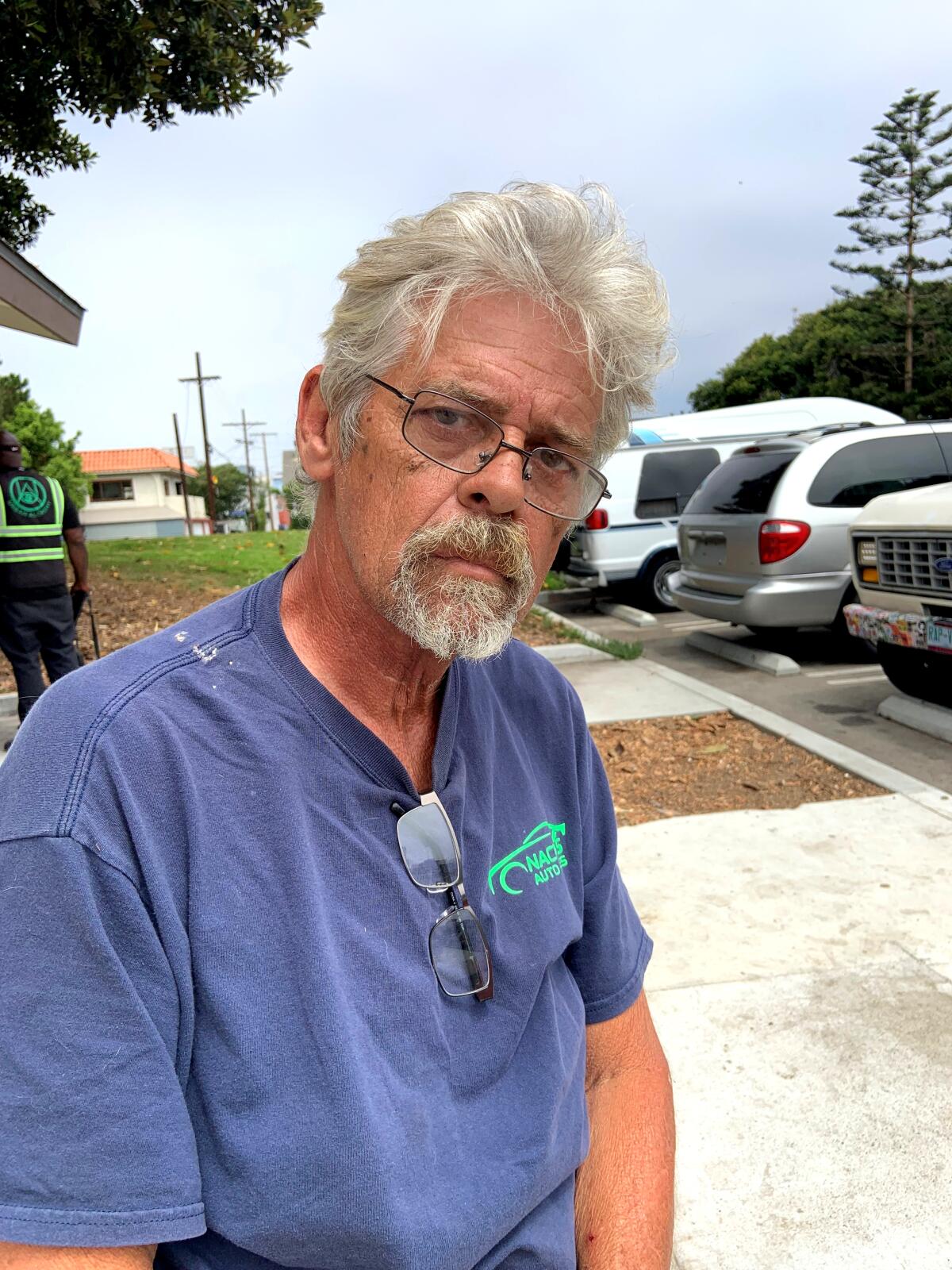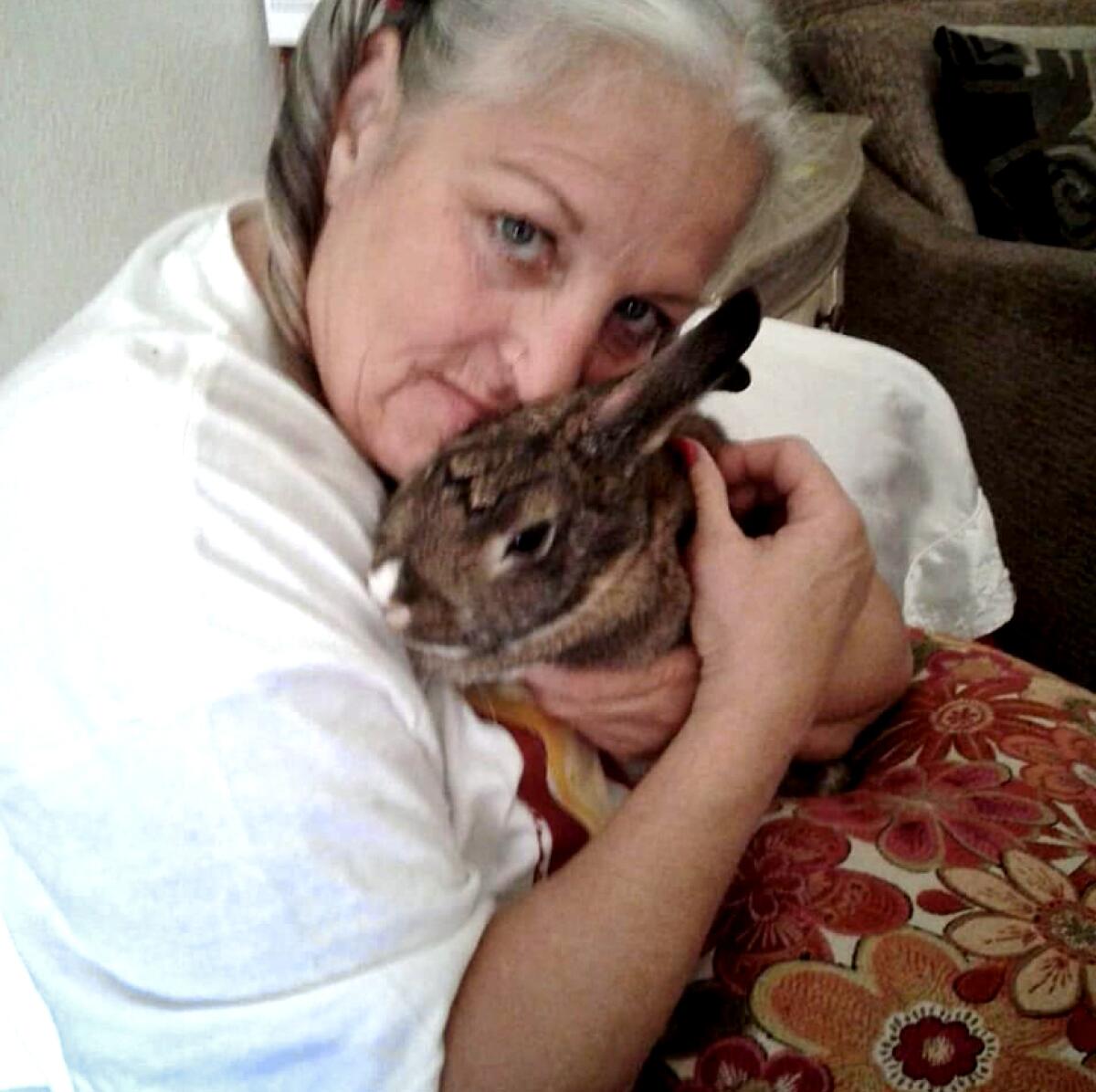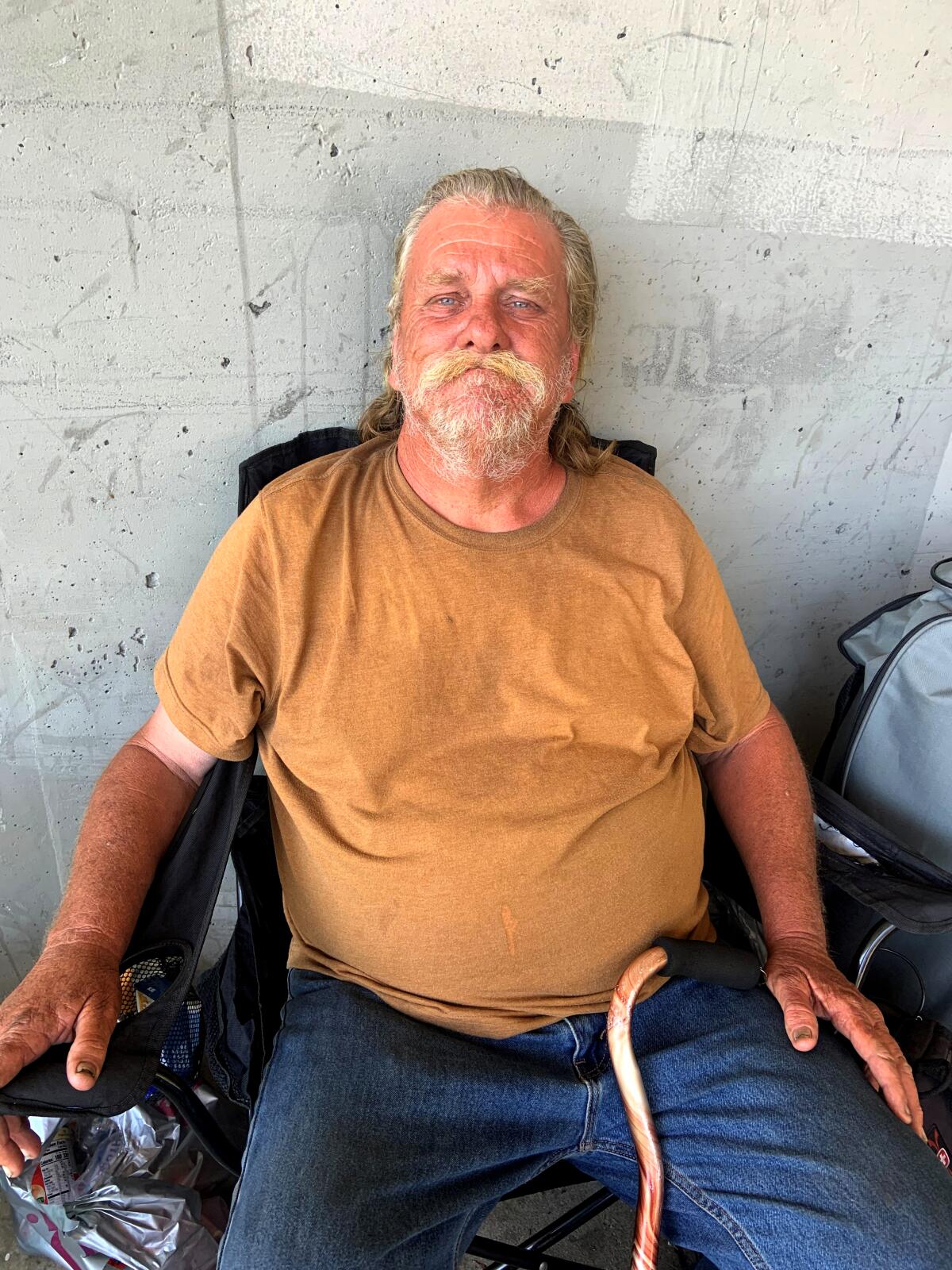Newsletter
A cure for the common opinion
Get thought-provoking perspectives with our weekly newsletter.
You may occasionally receive promotional content from the Los Angeles Times.

Most of the time we don’t question what is holding our lives together. If it works, it works.
Sometimes, though, things fall apart.
In the past year I’ve talked with some of the 40,000 unhoused people in the city of Los Angeles, and I’ve found that many were basically getting by until grief knocked them off their feet.
I had conversations recently with two men living unhoused on the Westside whose lives were disrupted by the loss of a spouse. Steve and Jeffrey had each been married — to women named Lisa, coincidentally — and each man lost his wife to cancer. Marriage had been a steadying force for them, and without their spouses, Steve and Jeffrey were both thrown into spirals of grief that upended their lives in profound ways.
Sometimes slipping into homelessness is a result of events over which we have no direct control, events that set off a cascade in our lives. Remembering this seems crucial as our community tries to address this overwhelming issue.
Steve and Jeffrey agreed to share their stories with The Times on the condition that their last names not be used. — Robert Karron teaches English at Santa Monica College.
My name is Steve, and I’m 63 years old. I’m originally from Chicago, and I graduated from high school in the suburbs. This was in the ’70s, before all the nonsense, when they still believed in education. So it was pretty good. My favorite subject? Auto shop. I can still fix cars — old ones, that is. I could take apart a ’65 Chevy and put it in that building — but I couldn’t touch a new car. They’re computers now. At 18, I came out here to try to be an actor. I was an extra for a while, and I met some good people. Then I met a girl. I got her pregnant. That was the end of my acting career. That and the next one were practice marriages, but then I met Lisa. We were married 30 years. I got lucky with her.
Why did it work? Well, every time Lisa would go to the store, she’d come back with cupcakes for me. It was the way she took care of me. That’s why it worked. I wasn’t the easiest thing in the world to take care of, but she never turned her back on me.

For a while Lisa and I lived in Koreatown, in Section 8 housing. Then they started booting the Section 8’s out, because we weren’t paying market rate. They didn’t boot us out, exactly. They just kept refusing to fix stuff. I waged a battle that took eight months, and they still wouldn’t budge. When it wasn’t safe for Lisa anymore, we left. Soon after that we got a motor home. We went all over the country, mainly to Arizona. Sedona is the most beautiful place in the world.
Lisa got sick about 10 years ago. Her ashes are buried in Sedona. When I have any money at all, I’ll drive out there, to talk to her. Sometimes I’m only there for one hour, until I have to head back. It’s worth it.
I was a drug addict for a long time. Lisa — and a judge — saved my life. It started with Lisa. She was frustrated, to say the least. One day — it was right down there, by that bus stop — she took a brick and she hit herself in the face. Then she called the police and told them I did it. I was arrested, and the judge gave me two choices: six months in rehab, or three years in state prison. I chose rehab. Someone told me about Warm Springs, in Castaic (it’s since burned down). They picked me up and took me to the mountains for a four-month program.
When I was there, I realized I’d wasted my whole life. I’d wasted my relationships with my children. I’d wasted everything in the world. I got sober, I’ve been sober for 14 years. There’s three reasons why I won’t relapse. I won’t dishonor my wife. I refuse to feel that drugged up again, ever. And look around: Even if I wanted to, you can’t trust drugs nowadays. My dealer from years ago was a friend. I know he’d never hurt me. But where does he get it? That’s the problem.
The police say the people on Venice Boulevard have ‘rights.’ You know who also has rights? People who are paying $3,500 a month to rent houses along Venice Boulevard.
— Steve
So, I’m homeless, fine. I sleep in that car. But I have issues with people who don’t clean up after themselves. See, these people, living in their cars, they work for a living. This guy works at a cafe. That one is a waiter someplace else. It’s not like the nonsense with the guys in tents, on Venice Boulevard. There’s no excuse for that. The police say the people on Venice Boulevard have “rights.” The other day there was a girl, right there, high, naked, taking a dump in a dog bowl. I told her to get the hell out of here. But then the police came and said I couldn’t say that, because she has “rights.” You know who also has rights? People who are paying $3,500 a month to rent houses along Venice Boulevard. They have the right to look out their window and not see a bunch of tents. If California doesn’t do something about this soon, people aren’t going to visit anymore. If Sven and Greta, in Sweden, want to go on vacation, are they going to come here, to look at the tents, before they go to Disneyland? No, they’ll go to Florida, to Disney World, instead.
I drove a cab for 30 years. It was a great education. I’d get four newspapers a day — USA Today and some others. I’m good at placing accents, so when I picked people up, if they had an accent, I’d ask them about the news in their part of the country — which I knew about from reading the papers. I ended up gaining a following, not just because of that but because of how I treated people. Other cab drivers would take people from the airport the long way, so it was 55 bucks, but I’d take the short way, so it was only 30. I’d wind up getting a 10-buck tip, and they’d still save money. Eventually I had to stop driving a cab. You know how they say you shouldn’t pick up hitchhikers? Well, every day I picked up random people, and I have the knife wounds and the bullet holes to prove it. Shot twice, once in the head. Stabbed several places. They wanted my money. But, let me tell you something, they never got it.
I was working for a cab company when I met Lisa. I was dispatching, and Lisa called for a taxi. I talked to her. I liked her voice. We ended up chitchatting, and we clicked. She ordered a cab, and I told the cabbie that when he picked her up, he should bring her to the office, to me. We were inseparable until the day she died. She was a month older than me, so I called her the Cougar.

She used to volunteer at the senior center here, before the city turned it into offices. It was an important place for her. Years later, when she was getting treatments, we’d come here with the dogs. She’d cry when she saw how bad it’d got. When she was working here, it was a nice place, but then it got overrun. She died on March 9, 2021, and I came to this park the very next day. I thought: I’ll clean this place up, in Lisa’s memory. And I did it. A lot of it was bribery, to be honest: 10 bucks here, 20 bucks there. I ended up spending $7,000 of my own money to pay people to leave. It cost me every cent I had. But now it’s a safe place. There used to be 40 tents here, and now they’re all gone. Women and children come here. It wasn’t like that before. I want to turn this place back into a senior center and to name it after Lisa. That’s my goal now. And I’m not going to let up.
My name is Jeffrey, and I’m 60 years old. I stay here during the day, under this freeway overpass, because it’s cool, and there’s a breeze. I sleep down the street. I don’t make a mess anywhere I go. I carry everything I need in this bag. No one gives me any trouble because I keep it clean. If you’re clean, and you’re not causing any trouble, the police tend to leave you alone. I’ve been living on the streets for about three years, but I’m close to getting Social Security — and they owe me for seven years, so that will help get me back to Arizona, where I’m from. It’s within reach. I just heard from them. I should get my money by Oct. 3.
I grew up near Tucson. I came out here for a job that didn’t pan out. Then I started having problems with my hip, then my knee. I’ve been through hip replacement surgery, and I need knee replacement surgery. Also, three years ago I lost my wife to cancer. I’d taken care of her for six years. After she died, I went through a lot of money I shouldn’t have gone through. I didn’t spend it on drugs or alcohol; I’ve never been much of a partier. I spent it on things like staying in hotels, and eating well. I was missing her. I was grieving. After that, I realized I needed to get away. So I came here for the job, but it didn’t pan out.

I worked in the music industry — security, protecting the bands from the fans. Styx, Journey, Def Leppard. I did one Shania Twain tour. It was her first tour, and everyone was amazed she was already a headliner. My dad was a cop, and he made extra money working concerts. When I was old enough, he got me into it. The main band I worked with, for many years, was Styx — one of the rare bands that didn’t use any drugs.
I graduated from the same high school as Linda Ronstadt — Catalina High in Tucson. I had lots of friends there, and I’m actually still in touch with one, Pete. We met in the third grade. We still talk on the phone. I got my phone with the General Relief fund, which you can get at Social Services. They also give you food stamps, and there’s a hot food program, too. The hot food around here is mainly fast food, though, so I tend to buy stuff at the store and just heat it up myself. I have a single-burner stove. Sometimes I also watch movies on the phone. I just saw the new Elvis movie. The guy impressed me that played him. He doesn’t really look like Elvis, but he kind of captured his essence.
I don’t think I can go back to concert security. I still have to get my knee replaced. For concert security, you have to be quick on your feet. After the knee surgery, I might manage a bar that my cousin owns, near Tucson. I’m not a drinker, so I’d be perfect for that job. That’d give me something to do where I wouldn’t be running up and down stairs.
One reason it’s hard is because I don’t talk to that many people. I used to talk to my wife.
— Jeffrey
How did I meet my wife? I was 22, in New York. I was with Pete, and we were walking around lower Manhattan. He was living there, showing me around. I saw this girl, and I said to Pete: “Wow, look at her.” She was wearing a white dress, a bit above her knee. Pete said: “You would never stand a chance.” I walked up to her and talked to her. I told her she had the most beautiful blue eyes I’d ever seen — because she did. Lisa was Italian, from Bensonhurst. After that we kept in touch. Eventually, I moved to New York. After the first winter, I said to Lisa: “I don’t know if I can live here, because I’m freezing to death.” Tucson can get cold. Some days it can get down to 17 degrees. But in New York City the high can be 17. Also, it’s so crowded, like it is here. That’s why I like Tucson; there’s more room. And it’s so much more affordable. Anyway, after about a year, I asked Lisa to marry me, and she said yes. Then she said: “By the way, we can move to Arizona. I’m sick of this cold, too!” (She hated shoveling snow.) In Tucson, she said: “It’s hot, but I can deal with it.” She became a nurse, and we had four daughters.
The twins are in the Air Force now. They’re overseas, so it’s hard to talk to them. But I talk to the other two, two or three times a week. They sort of know where I am, but they don’t know everything. What they do know is that I want to get out of this by myself. I don’t want their help.
I owned a house with Lisa. When she died, I sold it and gave all the money to the girls for their education. Still, I feel they shouldn’t bear financial responsibility for me. I’ve been in touch with my sister, in Arizona, though. I might move in with her, in October, when I get the Social Security money. It’s getting hard for me out here.
My neighbors and I in Venice see the suffering among unhoused members of our community. Many need addiction treatment and mental health care.
One reason it’s hard is because I don’t talk to that many people. I used to talk to my wife. She knew me better than anyone. I think I knew her better than anyone, too. Sometimes I still talk to her, in my mind. Sometimes people tell me, you need to meet somebody. I say I had somebody. I don’t think I’ll find that again. We were soulmates. I think God put her in my path, I really do. If you’re a good person, good things will happen to you. She was an identical twin, and one time her sister bet her $100 that she could fool me. I got home, and her sister was wearing one of her dresses. I said, “Hi, babe!” But when she kissed me, I knew. She said, “How’d you know?” I said, “Because you don’t kiss me the way Lisa kisses me.” And no one ever has.
When I get to Arizona, the first place I’m going is the cemetery. It’s not just to pay my respects to Lisa. It’s for my parents, and my grandparents, too. I have eight graves to visit. Even though my grandmother died in 1985, I still want to pay my respects. My dad’s there, too. He lasted until 2007, when he was 78. He passed away Christmas Eve. He just went to sleep, and he didn’t wake up. I told my sister that’s how I want to go, when my time comes. Just go to sleep, no pain. I’m the one who found him. At first, I thought he was sleeping. Then I realized. I just sat there for a minute, looking at him. He had a peaceful, serene look on his face. You know he wasn’t in any pain, because you’d be able to see that.
Three men recount their family ties, their romances, how they came to live on the street and how they make ends meet.
Three men, in their 50s, 60s and 70s, represent a growing population among L.A. County’s unhoused.
A cure for the common opinion
Get thought-provoking perspectives with our weekly newsletter.
You may occasionally receive promotional content from the Los Angeles Times.